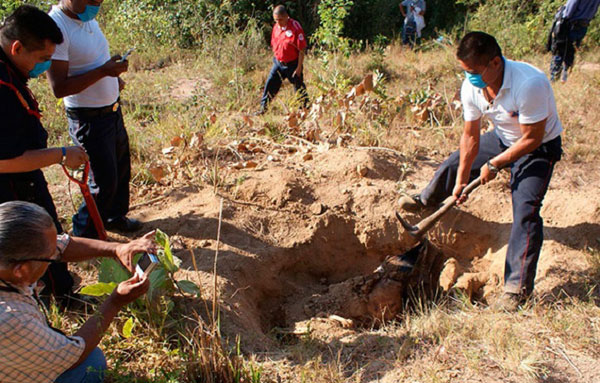Rights Commission also found that 57,861 people have been reported missing in 20 years
Reported by Mexico Daily News
It’s been a bad week for the government with regards to human rights. A charge of “ethical bankruptcy” of civil servants was followed by the news that the number of secret, mass graves has been counted: the total came to 855 found in the last 10 years.
The count was carried out by the National Human Rights Commission (CNDH), which revealed yesterday that those secret burial grounds contained 1,548 bodies.
But the number is lower than that obtained through another separate tally undertaken by the commission. The count of 855 graves came from data obtained through a freedom-of-information request it made to the country’s 32 states — with which six did not comply.
So in order to compile a more comprehensive tally for a special report on forced disappearances and mass graves, the CNDH collected information published by the news media between Jan. 1, 2007 and Sept. 2016.
The new figure found there were 1,143 mass graves containing 3,230 bodies in 30 states.
The CNDH also counted the total number of missing persons reports filed during the last 20 years and came up with 57,861. Of those, 32,236 remain open.
A commission inspector said disappearances challenge the abilities and resources of the Mexican state. Ismael Eslava Pérez also warned of the existence of a structural problem in the institutional design and the performance of different government agencies, which prevents them from making the progress desired.
Eslava’s comments came a week after the human rights ombudsman presented the commission’s annual report at an event in Los Pinos, the official residence and office of President Enrique Peña Nieto.
In his report, Luis Raúl González Pérez said that during 2016 authorities at all three levels of government were unable to guarantee respect for and compliance with human rights.
In some parts of the country, González declared before Peña Nieto, not even the minimum security conditions existed that would enable people to live together in peace.
The ombudsman said issues such as corruption, impunity and accountability are key obstacles on the road to guaranteeing full respect for the rights of the Mexican people.
“Whether due to bureaucratic inefficiencies or the ethical bankruptcy of public servants, the truth is that this situation has bolstered the societal perception that law abidance and enforcement is a discretionary affair”, said González.
Ongoing and increasing cases of torture, forced disappearances and extrajudicial executions have continued thanks to the poor training and apathy of government officials, he continued.
González pointed to the work done by the relatives of the disappeared, who by starting their own searches have turned up a large number of mass graves, “tracing an authentic geography of pain and indifference in our country”.
During 2016, the CNDH issued 72 recommendations over rights violations to 55 government figures or agencies, up 20 percent over the previous year.
The five agencies that received the most recommendations were the Social Security Institute with 15, the Secretariat of the Navy with 7, the federal Attorney General’s office and the National Security Commission six each and the Defense Secretariat with five.
Only two of the 72 recommendations have been fully complied with; 54 have been partially met and 14 have been received without any proof of compliance.
González reprimanded government agencies not only for failing to comply with the CNDH’s recommendations, but also for the long delays in doing anything with them.
Wanted ex-governor arrested in Italy
Tomás Yarrington wanted on money laundering and other charges in Mexico, and US
Former Tamaulipas governor Tomás Yarrington Ruvalcaba, a wanted man for the last five years, was arrested April 10, in Florence, Italy.
Sought in both Mexico and the United States for racketeering, money laundering, drug trafficking and fraud, Yarrington was Institutional Revolutionary Party governor from 1999 until 2005, after which he attempted to become the party’s 2006 presidential candidate.
But his ambitions were halted when he was indicted in Texas in 2013 on racketeering, money laundering and fraud charges, amid accusations of accepting bribes from the Gulf Cartel and its armed wing, Los Zetas, which dated back to his time in office.
There are conflicting reports about the timing of criminal charges filed against Yarrington in Mexico. Some say he was charged in 2012, others report it wasn’t until 2016, when the federal Attorney General’s office (PGR) offered a 15-million-peso reward.
The charges against him in Mexico are for organized crime and money laundering. His extradition from Italy is expected to take place within days.
In 2012 Yarrington was singled out for laundering millions of dollars for the Gulf Cartel and Los Zetas after a member of the former gave evidence against him to the U.S. Drug Enforcement Administration (DEA).
He has also been accused of plotting the assassination of Rodolfo Torre Cantú, the Institutional Revolutionary Party (PRI) candidate for governor in 2010.



